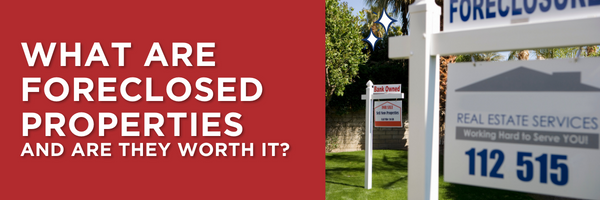You will have a variety of options when it comes to investing in real estate.
Foreclosed homes are one item you'll run into if you're seeking investments. Despite their widespread use, few people consider purchasing them as investments.
If this is your first time hearing about foreclosed properties, you might be wondering what it means -- what are foreclosed properties really about?
If that's the case, you're in the right place. In this post, we'll answer that and more!
What Is A Foreclosed Property?
A foreclosed property is a property that has been repossessed by a lender or a bank as a result of the owner's inability to keep up with mortgage payments. This can occur when a homeowner defaults on their mortgage loan, typically due to financial hardship, and is unable to make the required payments to the lender.
When a property is foreclosed, the lender or bank takes possession of the property and attempts to sell it to recover the outstanding balance on the mortgage loan. Foreclosed properties are often sold at a discount compared to their market value, making them attractive to investors or buyers looking for a bargain.
However, it's important to note that purchasing a foreclosed property can come with risks and complications, such as liens or outstanding debts attached to the property, as well as potential repairs and maintenance issues. It's important to thoroughly research and understand the potential risks and benefits before considering purchasing a foreclosed property.

Things To Consider Before Purchasing Foreclosed Properties
Purchasing a foreclosed property can offer an opportunity for a good deal, but it's important to carefully consider the potential risks and complications involved. Here are some things to consider before purchasing a foreclosed property:
- Property Condition: Foreclosed properties are often sold "as-is," meaning that the buyer is responsible for any repairs or maintenance issues. It's important to have the property inspected by a professional to identify any potential issues and estimate repair costs.
- Financing: Financing a foreclosed property can be more challenging than a traditional home purchase, as banks may require a larger down payment or have stricter lending requirements.
- Liens And Outstanding Debts: There may be liens or outstanding debts attached to the property, such as unpaid property taxes or homeowners association fees, that the buyer will be responsible for. It's important to do a thorough title search and understand all potential financial obligations before making an offer.
- Competition: Foreclosed properties can be attractive to investors and buyers looking for a bargain, which can lead to multiple offers and bidding wars. It's important to be prepared to act quickly and make a competitive offer if interested in purchasing a foreclosed property.
- Location: The location of the foreclosed property is an important factor to consider, as it can impact its value and potential for resale or rental income. It's important to research the local real estate market and understand the neighborhood before making an offer.
- Legal Process: The legal process of purchasing a foreclosed property can be more complicated than a traditional home purchase, as it involves working with the bank or lender that owns the property. It's important to understand the legal process and work with professionals, such as real estate agents and attorneys, who have experience with foreclosures.
Overall, it's important to thoroughly research and understand the potential risks and benefits of purchasing a foreclosed property before making an offer. Consulting with professionals and conducting due diligence can help mitigate risks and ensure a successful purchase.
Is Buying a Foreclosed Property A Good Investment?
Buying a foreclosed property can be a good investment opportunity, but it also comes with some risks and challenges. Here are some factors to consider before making a decision:
Advantages Of Buying A Foreclosed Property:
- Lower Purchase Price: Foreclosed properties are usually sold at a lower price compared to their market value, which means you can get a good deal if you're able to negotiate effectively.
- Profit Potential: If you buy a foreclosed property at a low price, you may be able to make a profit if you renovate it and sell it for a higher price or rent it out.
- Opportunity For Equity: Since the purchase price is typically lower, you may be able to build equity faster if you're able to pay off the mortgage quickly.
Disadvantages Of Buying A Foreclosed Property:
- Condition of the property: Foreclosed properties may be in poor condition, as they may have been neglected or vandalized. This can lead to costly repairs and renovations.
- Time-consuming process: The process of buying a foreclosed property can be more time-consuming than buying a traditional property, as there may be additional paperwork and legal requirements.
- Competition: Foreclosed properties may attract a lot of interest from investors and homebuyers looking for a good deal, which can lead to a bidding war and drive up the price.
Before deciding to invest in a foreclosed property, it's important to do your research and assess the potential risks and rewards. You should also work with a real estate agent who has experience with foreclosures and can guide you through the process.
Want to invest in foreclosed properties? If yes, our team at RE/MAX Advanced Realty is here for you! Contact us by clicking this link.

